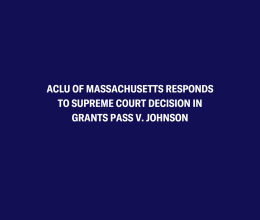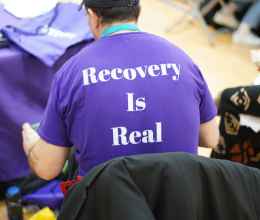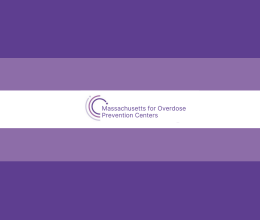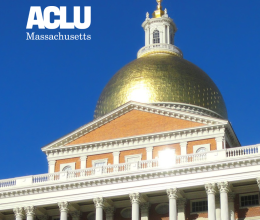
In ACLU and CPCS victory, court orders disclosure of records from DOJ investigation of Springfield police
In a major decision, the Massachusetts Supreme Judicial Court (SJC) today ruled that the Hampden County District Attorney’s Office (HCDAO) violated its duties to disclose and inquire about exculpatory evidence of widespread misconduct by the Springfield Police Department (SPD), following a damning report by the U.S. Department of Justice (DOJ) in 2020. The court also ordered the HCDAO to disclose in criminal cases all documents known to have been reviewed by DOJ in the production of that report.
“This is a tremendous victory for due process and the rights of people accused of crimes,” said Carol Rose, executive director at the ACLU of Massachusetts. “With this ruling, the Supreme Judicial Court has sent a clear message to prosecutors and other law enforcement officials that they cannot ignore their fundamental duties to investigate and disclose potentially exculpatory evidence, such as the shocking reports of systemic and widespread police misconduct in Springfield.”
In April 2021, the ACLU of Massachusetts — together with the Committee for Public Counsel Services (CPCS), the law firm Goulston & Storrs, and the national ACLU — filed a lawsuit asking the Supreme Judicial Court to hold that the state must investigate allegations of systemic Springfield police violence, false reporting, and other misconduct, and to ensure that the HCDAO properly discloses that misconduct as exculpatory evidence in criminal cases. The lawsuit pointed to the 2020 DOJ report, as well as criminal indictments, community complaints, media reports, and lawsuits, as indicators of systemic and egregious SPD misconduct.
“With this ruling, the SJC strengthens the transformative rule it established in the wake of the drug lab scandals: that the burdens of systemic government misconduct should not be shouldered by the people who were subjected to that misconduct,” said Matthew Segal, senior staff attorney with the ACLU State Supreme Court Initiative. “The people of Springfield were victimized twice: first by the police, and again by prosecutors. The SJC has rightly stepped in to restore some much-needed credibility to the criminal legal system in Hampden County.”
In response to the ACLU and CPCS’s work to remedy the Massachusetts drug lab scandals, courts have made clear that the Commonwealth has a duty to investigate and disclose, on a case-by-case basis, egregious misconduct by government employees, including police officers, who participate in criminal cases as members of prosecution teams. Litigation by the ACLU and CPCS in the wake of the drug lab scandals overturned more than 61,000 wrongful drug charges. But hearings and filings in the Graham case revealed that no one in Massachusetts government had ever investigated the full extent of the SPD misconduct, even in light of the DOJ’s findings that SPD officers engaged in a pattern or practice of excessive force.
“This opinion vindicates what we alleged in our lawsuit – that the Hampden County District Attorney’s Office has too often not complied with its ethical and constitutional duties to obtain and disclose exculpatory evidence,” said Anthony Benedetti, Chief Counsel at CPCS. “For years, our clients have endured unfair prosecutions, and our attorneys have gone into cases with one hand tied behind their backs. We have had to go to great lengths to try to get the information to which our clients are constitutionally entitled because the district attorney’s office was shirking its duties. We are hopeful that now that SJC has even more explicitly defined the prosecution’s obligations, our clients will get the information they need. And we look forward to reviewing all the information that the court has ordered the district attorney to give to us.”
“We are honored to partner with these incredible organizations to address misconduct identified by the DOJ and bring positive change to the criminal justice system,” said attorney Matthew Horvitz at Goulston & Storrs. “Our firm has a deeply rooted tradition of representing individuals in need and nonprofit organizations that serve them. We are privileged to take on important causes that impact our communities, including this one.”
“It was a long road, but by creating a path in which the systemic misconduct of the past can be uncovered and by creating clear rules as to when exculpatory information must be turned over to advocates and the clients they serve, today's decision by the Supreme Judicial Court in the Graham case is a victory for the people of Hampden County, our constitutional system and the rule of law,” said Hampden County Lawyers for Justice.
The lawsuit was filed on behalf of people and groups affected by these government failures: two individuals who have been prosecuted in Hampden County, two criminal defense lawyers who practice in Hampden County, CPCS itself, and the bar advocate organization Hampden County Lawyers for Justice.
For more information about Graham v. District Attorney for Hampden County, go to: https://www.aclum.org/en/cases/graham-et-al-v-district-attorney-hampden-county







